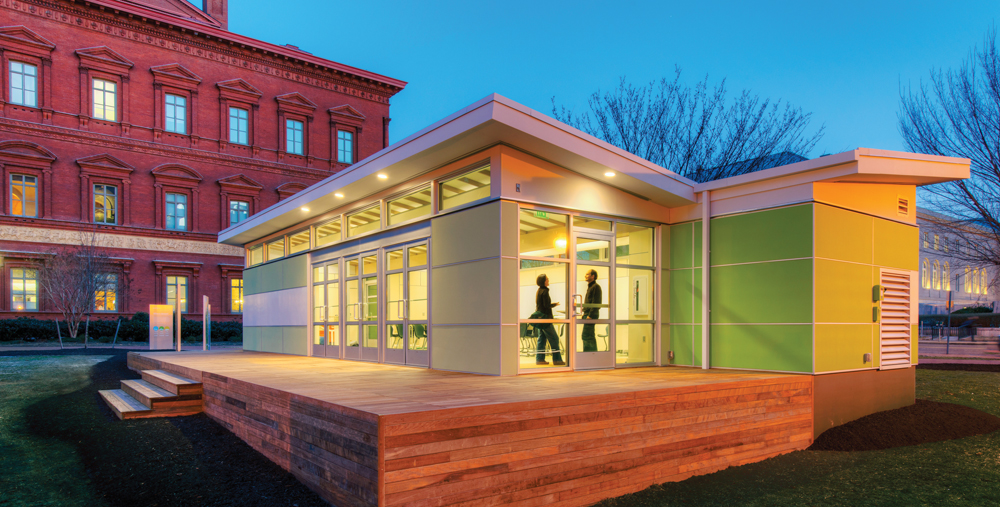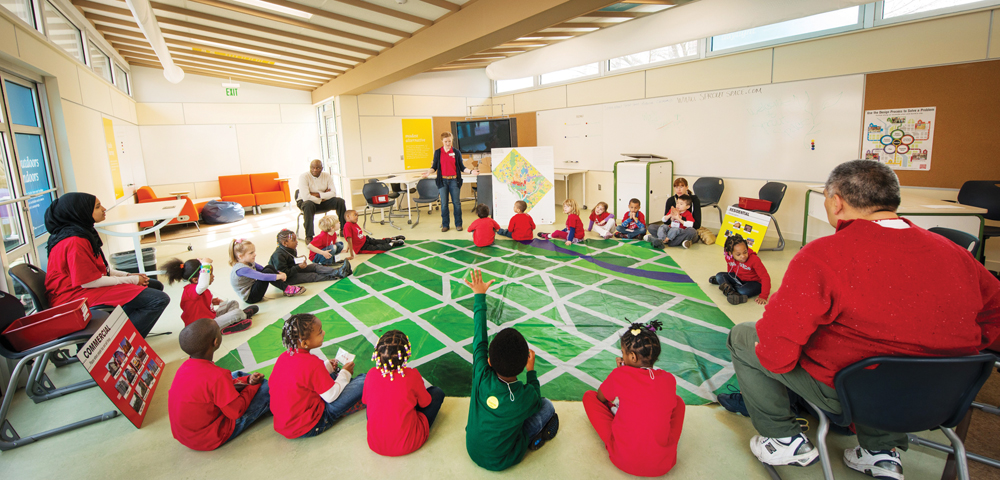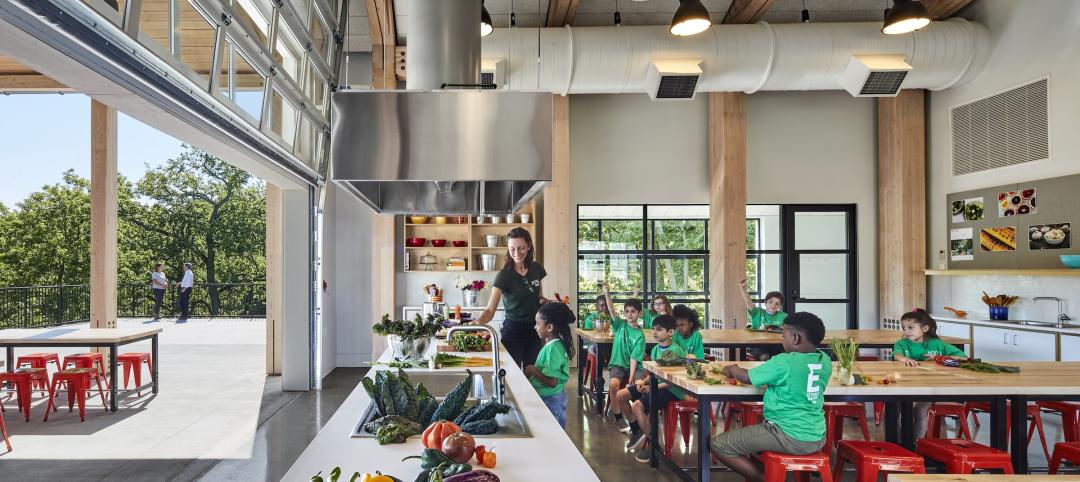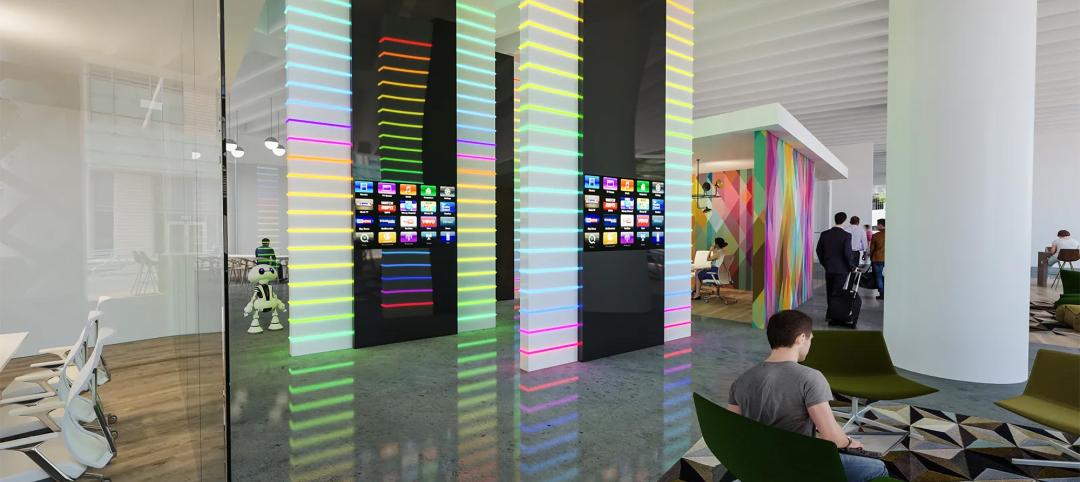While modular construction offers many benefits—notably less construction waste, project delivery efficiencies, and factory-controlled, high-quality fabrication—school districts frequently view modular as a temporary solution, and settle for units with poor design and low-quality materials. As a result, when the “temporary” modules inevitably turn into permanent structures, they fall short in terms of aesthetics and building performance.
Today, however, school districts are starting to look at higher-quality modular construction, with the understanding that the classrooms may remain on site for a number of years and must provide a proper learning environment, says Wendy Rogers, AIA, LEED AP BD+C, Design Principal with LPA Inc.
Building Teams are using incremental improvements as a strategy to create better modular solutions. For example, in a recently completed a 35,000-sf modular two-story project, LPA pushed the manufacturer to upgrade many of its standard details in order to ensure that the products met the project’s design criteria.
When executed properly, prefab construction can offer column-free interior spaces that promote flexibility and access to crawl space, open ceilings that allow for easy technology upgrades, and rainscreen building envelopes that are highly insulated and allow options and variation for exterior materials, according to Chester Bartels, Senior Designer with Baltimore design firm Hord Coplan Macht.
For example, the firm’s modular learning studios at the Barrie School in Silver Spring, Md., easily convert into large group learning spaces, multiple small group collaboration areas, and a large town hall lecture room—all supported by flexible furniture, movable wall panels, smart boards, good acoustics, and strategically designed fenestration for optimized daylighting and views.
A recent exhibition, Green Schools, at the National Building Museum in Washington, D.C., included a green classroom called “Sprout Space,” developed by Perkins+Will. (See the time-lapse video of its construction at: http://www.nbm.org/media/video/green-schools/sprout-space-time-lapse.html.) P+W’s modular template in Sprout Space offers a healthy, sustainable, and flexible 21st-century modular classroom. The design incorporates passive and active green-building strategies and is highly customizable.
For instance, Sprout Space can incorporate sunshades, integrated rainwater collection, photovoltaic roof panels, LED lighting with lighting controls, efficient heating and cooling systems, and eco-friendly materials. “Sprout Space also features a dynamic plan that is well-suited for various teaching styles, seating configurations, and outdoor learning opportunities,” says Steven Turckes, P+W’s K-12 Education Global Market Leader. “Each classroom opens up to the outdoors through large bifold doors, encouraging experiential learning, expanding the classroom, and complementing numerous teaching methods.”
Because fabrication occurs simultaneously with foundation and site work, high-quality modular classrooms can be completed four times faster than conventional stick-built projects, says Turckes. Available in modules up to 1,500 sf in size, multiple buildings can also be linked together to create an entire school.
Another customizable modular template, called simply “sky,” comes from contractor Silver Creek Industries (silver-creek.net). This high-performance modular classroom, which has been approved by the California Division of the State Architect, offers two contemporary floor plans and a variety of interior and exterior finish options—low- and no-VOC finishes, paints, and adhesives, sound-absorbent surfaces, high-performance windows, clerestory windows, tubular skylights, and an occupancy- and photo-control dimming system.
Ryan McIntosh, LEED AP BD+C, Project Manager and Director of Design Services for Silver Creek, says that sky modules beat California’s Title 24 baseline by up to 45%. The module has been developed to meet the CHPS PreFAB rating system, a label that designates qualifying prefabricated classrooms for use in high-performance building projects. Schools and districts can apply the CHPS PreFAB rating toward CHPS Verified recognition for new classrooms.
Related Stories
Student Housing | Feb 19, 2024
UC Law San Francisco’s newest building provides student housing at below-market rental rates
Located in San Francisco’s Tenderloin and Civic Center neighborhoods, UC Law SF’s newest building helps address the city’s housing crisis by providing student housing at below-market rental rates. The $282 million, 365,000-sf facility at 198 McAllister Street enables students to live on campus while also helping to regenerate the neighborhood.
MFPRO+ News | Feb 15, 2024
UL Solutions launches indoor environmental quality verification designation for building construction projects
UL Solutions recently launched UL Verified Healthy Building Mark for New Construction, an indoor environmental quality verification designation for building construction projects.
MFPRO+ News | Feb 15, 2024
Nine states pledge to transition to heat pumps for residential HVAC and water heating
Nine states have signed a joint agreement to accelerate the transition to residential building electrification by significantly expanding heat pump sales to meet heating, cooling, and water heating demand. The Memorandum of Understanding was signed by directors of environmental agencies from California, Colorado, Maine, Maryland, Massachusetts, New Jersey, New York, Oregon, and Rhode Island.
MFPRO+ News | Feb 15, 2024
Oregon, California, Maine among states enacting policies to spur construction of missing middle housing
Although the number of new apartment building units recently reached the highest point in nearly 50 years, construction of duplexes, triplexes, and other buildings of from two to nine units made up just 1% of new housing units built in 2022. A few states have recently enacted new laws to spur more construction of these missing middle housing options.
Green | Feb 15, 2024
FEMA issues guidance on funding for net zero buildings
The Federal Emergency Management Agency (FEMA) recently unveiled new guidance on additional assistance funding for net zero buildings. The funding is available for implementing net-zero energy projects with a tie to disaster recovery or mitigation.
Hospital Design Trends | Feb 14, 2024
Plans for a massive research hospital in Dallas anticipates need for child healthcare
Children’s Health and the UT Southwestern Medical Center have unveiled their plans for a new $5 billion pediatric health campus and research hospital on more than 33 acres within Dallas’ Southwestern Medical District.
Architects | Feb 13, 2024
Pierluca Maffey joins Carrier Johnson + Culture as new Firmwide Head of Design
Carrier Johnson + Culture (CJ+C) has hired Pierluca “Luca” Maffey, International Assoc. AIA, as the firm's new Firmwide Head of Design and Design Principal.
K-12 Schools | Feb 13, 2024
K-12 school design trends for 2024: health, wellness, net zero energy
K-12 school sector experts are seeing “healthiness” for schools expand beyond air quality or the ease of cleaning interior surfaces. In this post-Covid era, “healthy” and “wellness” are intersecting expectations that, for many school districts, encompass the physical and mental wellbeing of students and teachers, greater access to outdoor spaces for play and learning, and the school’s connection to its community as a hub and resource.
Office Buildings | Feb 13, 2024
Creating thoughtful tech workplace design
It’s important for office design to be inspiring, but there are some practical principles that can be incorporated into the design of real-world tech workplaces to ensure they convey an exciting, sophisticated allure that accommodates progressive thinking and inventiveness.
Airports | Feb 13, 2024
New airport terminal by KPF aims to slash curb-to-gate walking time for passengers
The new Terminal A at Zayed International Airport in the United Arab Emirates features an efficient X-shape design with an average curb-to-gate walking time of just 12 minutes. The airport terminal was designed by Kohn Pedersen Fox (KPF), with Arup and Naco as engineering leads.


















